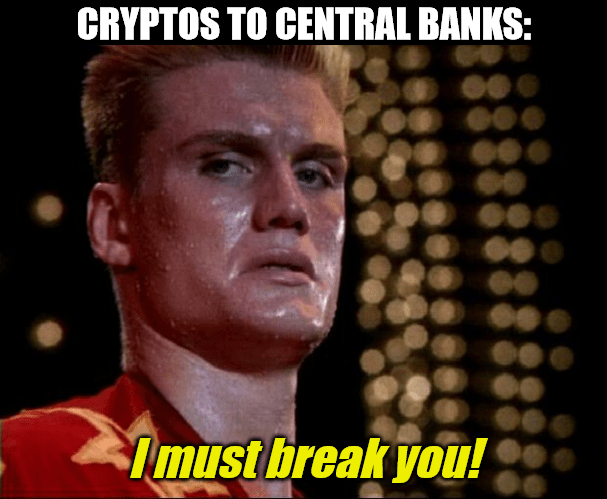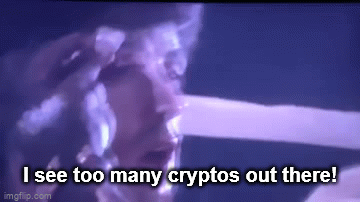
Bitcoin: There’s No Easy Way Out
Great Ones, Bitcoin’s (BTC) not indestructible. Baby, better get that straight.
I think it’s unbelievable how crypto gave in to the hands of fate. But some things are worth fighting for. Some investments never die. I’m not asking for another currency — I just wanna know why!
There’s no easy way out! There’s no shortcut home!
Last week, Great Stuff declared that bitcoin’s digital gold comparison was “Kaput. Irrelevant. Done-zo.” And I stand behind that assessment.
When the markets ran from the Russian invasion, bitcoin was left in the lurch while gold prices soared. What more proof do you need that bitcoin ≠ gold?
But that doesn’t mean that bitcoin and cryptos aren’t worth investing in. In fact, as it turns out, that little bitcoin dive was an excellent buying opportunity. BTC is up more than 25% from its post-invasion lows and is now sitting just below $44,000.
What’s more, the current rally has legs. Long legs.
So, if bitcoin isn’t a safe-haven investment like gold, why is the leading cryptocurrency rallying? Shouldn’t Wall Street investors treat BTC like all the other “risk off” tech investments out there?
Well, “risk off” was certainly the reason BTC plummeted in the first place, but then investors realized something rather fundamental about bitcoin and cryptocurrencies…
They’re decentralized. No central bank on the planet directly controls their value, usage, storage or trading.
Sure, many central banks around the world have tried to control cryptos. China and Russia all but banned them. The U.S. Federal Reserve is looking to heavily restrict and regulate them. But no one actually controls them … and that’s by design.
Many modern crypto investors don’t remember or care why cryptocurrencies were invented in the first place — to get your money out from under direct government control, and to do so securely in a way that cold hard cash and gold never could. That’s every capitalist’s and libertarian’s dream, right?
Don’t tread on my cash!
Well, as the saying goes: Be careful what you wish for.

The Russia/Ukraine crisis exposed a core element of crypto’s design that could have global consequences.
Specifically, the unregulated design of cryptocurrencies could allow Russia to get around financial sanctions.
Since central banks don’t control cryptocurrencies like bitcoin, they can’t stop cryptos from changing hands in sanctioned countries. That duty falls to the crypto exchanges, and while some of these exchanges are playing ball with central banks … many are not.
Take popular crypto exchange Kraken, for example. Kraken CEO Jesse Powell tweeted the following earlier this week:
Furthermore, a Kraken company spokesperson said the following in an email to Barron’s:
Freezing access to digital assets of citizens from an entire country does not necessarily punish those who are actually responsible and who may have already prepared for the possibility of blanket sanctions.
Binance, the largest crypto exchange on the planet, also weighed in on the sanctions situation:
Both are laudable standpoints from a position of personal financial freedom, but the cost of this freedom is a loophole in sanctions against Russian aggression.
On the opposite end of the spectrum, Great Stuff Picks holding Coinbase (Nasdaq: COIN) is enacting new measures for “sanctions screening” as part of its customer protocols. In layman’s terms, Coinbase has taken it upon itself to monitor crypto activity for anything that skirts sanctions.
The company also told Barron’s:
It’s important to remember here that Coinbase is a publicly traded company in the U.S., and not playing ball with U.S. financial regulators comes with a very hefty price tag.
Now, I don’t wanna pacify you. I don’t wanna drag you down.
But there’s no need to feel like a prisoner or a stranger in this crypto town. I see all the angry faces in my inbox, afraid that could be you and me.
You’re talkin’ about what might have been, while I’m thinkin’ about what I used to be…

Well … there is a way out. And it’s up to you how easy this goes!
For the last several months, Paul and his team have been perfecting their strategy to give YOU a chance to reap the benefits from this exciting new market…
A new world of blockchain, cryptos and this revolution of “Currency 2.0.”
According to Paul: “Our world is about to get a serious upgrade… And so you don’t get left behind, today we’re going to show you how to trade cryptocurrencies the Bold Profits way.”
The Good: Right On Target

In a sea of red reports, Target’s (NYSE: TGT) stellar earnings announcement stands out for all the right reasons.
The company just posted earnings per share totaling $3.19, compared with expectations for $2.86.
Revenue also leapt to $31 billion from the year-ago period, coming in just a smidge under analyst estimates for $31.39 billion.
That might sound like a slim victory until you consider the company’s $106 billion full-year revenue figure, which destroyed the $77.1 billion Target made back in 2020 — when people were still getting fresh rounds of stimulus checks and the global supply chain hadn’t completely collapsed.
Target said part of this growth can be attributed to a killer holiday season, which saw digital sales up 9.2% year over year. I just wonder how many of those digital shoppers were able to snag a PS5 … and how many goats they had to sacrifice to appease the click-bot gods.
While Target said it expects earnings and revenue to increase “at a slower pace than 2021,” TGT investors were still heartened by big red’s healthy holiday quarter.
As such, they kicked their full-year guidance fears further down the road and rallied Target stock 12% higher.
The Bad: Zoom & Gloom

“All I wanna do is Zoom-a-Zoom-Zoom-Zoom … but my boss wants me back in the office.” — Every work-from-home employee, probably.
Great Ones, we all knew that ongoing remote work was uncertain post-pandemic.
Now, after two years of freedom from early morning commutes, white-collar workers everywhere are slowly being beckoned back into their beige office spaces … and one company in particular is sharing their pain: Zoom Video Communications (Nasdaq: ZM).
Zoom became the go-to communication tool during the height of the pandemic thanks to its convenient videoconferencing — not to mention one of the stock market’s biggest growth stories.
But now that offices are opening back up again, Zoom’s cracks as a growth company are starting to show.
For one, Zoom’s year-over-year sales growth climbed just 21% in the latest quarter, which is the slowest period on record for the renegade video host.
Furthermore, even though Zoom’s $1.07 billion in sales did top analysts’ expectations this quarter … the company’s 2023 fiscal forecast of revenue between $1.07 billion and $1.08 billion came in below the Street’s $1.1 billion guidance.
Hence ZM stock’s 4% slide this morning.
While I have no doubt that Zoom will continue to dominate the videoconferencing market … the question on everyone’s mind is: How big will that market be now that everyone is going back to the office?
Share your prediction with me here: GreatStuffToday@BanyanHill.com.
The Ugly: Lucid Comes Up Lacking

Lucid Group (Nasdaq: LCID) investors were barely lucid this morning after the electric vehicle (EV) virtuoso slashed its 2022 vehicle production forecast by a brutal 40%.
Adding to the anguish, Lucid also reported a loss of $1 billion during the fourth quarter on revenue of $26.4 million, bringing Lucid’s losses to a grand total of $4.8 billion in 2021.
But hey, the car company said its production problems didn’t stem from semiconductor shortages like many of its EV companions, instead citing “commodity parts such as glass and carpet” as the main slowdown culprit. So … progress?
Thing is, in this inflationary environment, earnings misses and soaring costs are something that Wall Street has come to expect. Investors might not be happy about it … but they also understand the pressure car companies have come under in recent months.
However, cutting production amid soaring costs is something entirely different. Investors probably would have shrugged off the cost calamity if production wasn’t punished as well. But cutting production at a time when costs keep increasing? That’s no bueno, and investors realize it.
Given today’s 15% plunge, Wall Street clearly isn’t willing to drive down Lucid’s long and winding path to profitability … no matter how many assembly plants it plans to build for cars it can’t currently make.
And herein lies the problem with investing in EV startups: You never know which car companies are gonna cruise down easy street and which will wind up wrecked.
That’s why my colleague Ian King suggests EV enthusiasts look under the hood of the EV market and invest in pick-and-shovel companies that can profit no matter who dominates the market.
Take this little-known company, for instance.
It’s the only company in the entire Western Hemisphere with the capacity to produce the one material every EV needs. And yet hardly anyone knows about it.
That’s why Ian says now’s the time to buy this under-the-radar stock … before more EVs clog the roadways and everyone learns its name.
Click here now for the full story.
Pssst… Hey, Great One. Come ‘ere a sec…
Wanna buy some NFTs? No? Ha, alrighty then. How about a whole NFT marketplace? Now we’re cooking with gas!
No longer will you NFT fans have to trawl digital dark alleys and dubious listing sites to get your fix of blockchain-based Bored Ape NFTs…
In its bid to stay “with it” and “in touch with today’s youth,” Salesforce (NYSE: CRM) just announced its plan to start up a new NFT marketplace where one could create and sell NFTs.
And yes … we’re talking about that Salesforce. The cloud-software stalwart Salesforce.
And not everyone at Salesforce is ‘bout-it ‘bout-it when it comes to the company’s nifty NFT initiatives:
More than 400 employees have signed on to an open letter which was penned after the company’s announcement, and is being shared in internal messaging channels. The employee letter enumerates how the NFT market might undercut each of Salesforce’s five stated core values: trust, customer success, innovation, equality, and sustainability.
“The amount of scams and fraud in the NFT space is overwhelming,” it reads, also criticizing the carbon footprint of NFTs and citing research showing the financial benefits of NFTs are unevenly distributed.

Where oh where do we start with this mess? How about … all of it?
So we have a stodgy old software company getting into a questionable market that nobody actually wants, debuting a platform that nobody wants … for what?
So grifters can link up with gullible NFT buyers to pawn off more artificially “limited” digital monkey images? No thank you.
If we were at a point where NFTs had more uses than mere bragging rights to impress other NFT fans, then sure, Salesforce should start up that marketplace. But instead of ensuring the validity of, say, in-game purchases for video gamers, NFTs currently serve the role of glorified baseball cards.
And by the way, do any of y’all remember that big to-do last month about NFT fraud? When scores of digital artists had their art ripped and sold as NFTs … without their knowledge? Pepperidge Farm remembers.
‘Twas mere weeks ago that a “company” called HitPiece set up a digital storefront that literally pulled entire albums off of Spotify, reselling them as NFTs. Again … without any permission or communication with the actual artists.
I mean, do you want the Recording Industry Association of America (RIAA) to bury you under a litigation $#!^-storm? Because that’s how you get the RIAA to bury you under a litigation $#!^-storm.
This ain’t a hit piece on HitPiece (they managed that just fine themselves), but I do wonder: How would Salesforce verify that everything sold on its hypothetical NFT marketplace was actually from the creator and not just, you know, blatantly ripped art from the internet?
HitPiece is done-for, but the fact that it managed such a cash-grabbing stunt will be replicated all over the internet … and it’s all because of NFTs. What’s Salesforce’s plan there?
Frankly, I don’t know if Salesforce even knows what it’s getting into with the NFT space as it stands today … but its employees seem to get the gist.
I sold my soul to make this NFT, and then you … bought … one!
What do you think, Great Ones? Is a cloud-based NFT platform an actual good idea … or does this sound kinda Salesforced to you?
Drop me a line at GreatStuffToday@BanyanHill.com anytime. We’d love to hear from you!
And guess what? If you hit all the right buttons (including the one that says “send”) your email might even be featured in this week’s edition of Reader Feedback! We won’t turn your email into an NFT, either. Promise.
In the meantime, here’s where else you can find us:
- Get Stuff: Subscribe to Great Stuff right here!
- Our Socials: Facebook, Twitter and Instagram.
- Where We Live: GreatStuffToday.com.
- Our Inbox: GreatStuffToday@BanyanHill.com.
Until next time, stay Great!
Regards,
Joseph Hargett
Editor, Great Stuff












